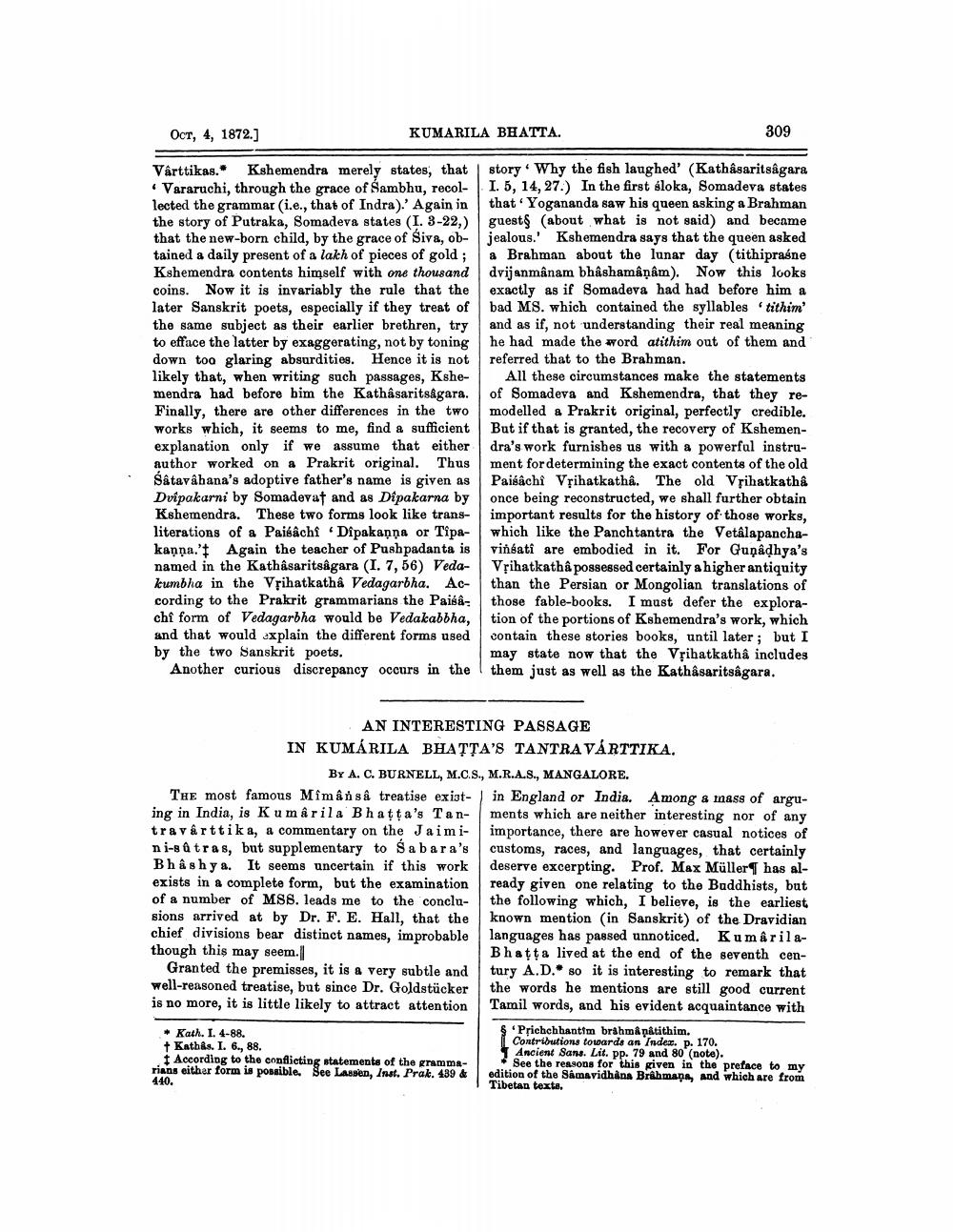________________
OCT, 4, 1872.]
KUMARILA BHATTA.
309
Vârttikas.* Kshemendra merely states, that story Why the fish laughed' (Kathasaritsagara · Vararuchi, through the grace of Sambhu, recol- I. 5, 14, 27.) In the first sloka, Somadeva states lected the grammar (i.e., that of Indra).' Again in that. Yogananda saw his queen asking a Brahman the story of Putraka, Somadeva states (I. 3-22,) guests (about what is not said) and became that the new-born child, by the grace of Siva, ob- jealous.' Kshemendra says that the queen asked tained a daily present of a lakh of pieces of gold; a Brahman about the lunar day (tithiprasne Kshemendra contents himself with one thousand dvijanmânam bhashamâņâm). Now this looks coins. Now it is invariably the rule that the exactly as if Somadeva had had before him a later Sanskrit poets, especially if they treat of bad MS. which contained the syllables tithim' the same subject as their earlier brethren, try and as if, not understanding their real meaning to efface the latter by exaggerating, not by toning he had made the word atithim out of them and down too glaring absurdities. Hence it is not referred that to the Brahman. likely that, when writing such passages, Kshe- All these circumstances make the statements mendra had before bim the Kathasaritsågara. of Somadeva and Kshemendra, that they reFinally, there are other differences in the two modelled a Prakrit original, perfectly credible. works which, it seems to me, find a sufficient But if that is granted, the recovery of Kshemenexplanation only if we assume that either dra's work furnishes us with a powerful instruauthor worked on a Prakrit original. Thus ment for determining the exact contents of the old Satavahana's adoptive father's name is given as Paisachi Vțihatkathâ. The old Vsihatkatha Dvipakarni by Somadevat and as Dipakarna by once being reconstructed, we shall further obtain Kshemendra. These two forms look like trans- important results for the history of those works, literations of a Paibâchí Dipakaņņa or Tipa- which like the Panchtantra the Vetâlapanchakanna.'t Again the teacher of Pushpadanta is viñéati are embodied in it. For Guņådhya's named in the Kathasaritsagara (I. 7,56) Veda- Vihatkathân possessed certainly a higher antiquity kumbha in the Vpihatkathå Vedagarbha. Ac- than the Persian or Mongolian translations of cording to the Prakrit grammarians the Paisa- those fable-books. I must defer the explorachi form of Vedagarbha would be Vedakabbha, tion of the portions of Kshemendra's work, which and that would explain the different forms used contain these stories books, until later; but I by the two Sanskrit poets.
may state now that the Vpihatkathâ includes Another curious discrepancy occurs in the them just as well as the Kathasaritsagara.
AN INTERESTING PASSAGE IN KUMÁRILA BHATTA'S TANTRA VÁRTTIKA.
BY A. C. BURNELL, M.C.S., M.R.A.S., MANGALORE. The most famous Mimârsâ treatise exist in England or India. Among a mass of arguing in India, is Kumârila Bhatta's Tan- ments which are neither interesting nor of any travårttika, a commentary on the Jaimi- importance, there are however casual notices of ni- tras, but supplementary to Sabara's customs, races, and languages, that certainly Bhashya. It seems uncertain if this work deserve excerpting. Prof. Max Müller has alexists in a complete form, but the examination ready given one relating to the Buddhists, but of a number of MSS. leads me to the conclu- the following which, I believe, is the earliest sions arrived at by Dr. F. E. Hall, that the known mention in Sanskrit) of the Dravidian chief divisions bear distinct names, improbable languages has passed unnoticed. Kumârilathough this may seem.
Bhatta lived at the end of the seventh cenGranted the premisses, it is a very subtle and tury A.D.* so it is interesting to remark that well-reasoned treatise, but since Dr. Goldstücker the words he mentions are still good current is no more, it is little likely to attract attention Tamil words, and his evident acquaintance with * Kath. I. 4-88.
$ Psichchhantim brshmå nåtithim.
Contributions towards an Index. p. 170. + Kathês. I. 6., 88.
Ancient Sans. Lit. pp. 79 and 80 (note). 1 According to the conflicting statements of the gramma- + See the reasons for this given in the preface to my rians either form is possible. See Lassen, Inst. Prak. 489 & edition of the Samavidhana Brahmans, and which are from 440.
Tibetan texta.




